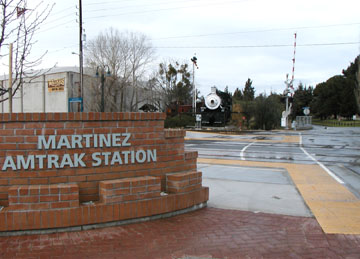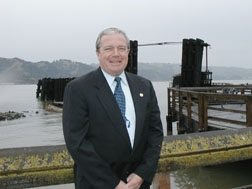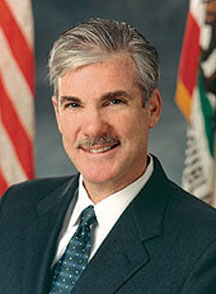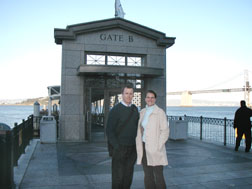
All Aboard for
Martinez
 |
| The
Martinez Amtrak station is the cornerstone of its intermodal
hub. |
Situated right on the Amtrak line,
the waterfront town of Martinez is just 32 miles northeast of San
Francisco and about 50 miles from Sacramento. Martinez covers 12.47
square miles, with a population of approximately 37,000. Step off
the train in Martinez and walk into a world removed from the hustle
and bustle of anywhere. Two parks, the Waterfront Park, an active
recreational area with playgrounds, bocce ball courts, softball
fields, and soccer fields, and the Martinez Shoreline Regional Park,
a more natural area run by the Eastshore State Park System are
within a short walk from the train station, with the Martinez Marina
located just beyond.
Also near the train station,
visitors can discover the 1,000-seat amphitheater which houses the
production of Mountain Days, the John Muir musical. The Willows
Theatre Company plans to make Martinez its home base starting in
2007, with a 500-seat theatre and administrative offices.
Martinez is proud of its history
as hometown to John Muir, the birthplace of Joe DiMaggio, and
allegedly the first town to invent the Martini. Numerous quaint
antique shops in the downtown corridor await the curious visiting
shopper who wants to take home a piece of Martinez history.
Town on the Move
Newly elected Mayor Rob Schroder
recently explained the vision of City leaders and residents in
making Martinez an attractive destination point for a new crop of
young residents and visitors by making it accessible to the rest of
the Bay Area. The city's Amtrak station, an intermodal hub
connecting the Capital Corridor and the Central Valley to Martinez
shuttle buses, just opened within the last couple of years, and the
North Concord/Martinez BART station is nearby. A shuttle bus is
available to transport passengers to and from the train station and
between a Marina parking area and the downtown. This is a town on
the move.
 |
| Martinez
Mayor Rob Schroder visited the location of a future ferry
stop: the Martinez Marina. |
Using the intermodal hub as its
starting point, the town Council sought to create a specific
transit-oriented development. Mayor Schroder said, "Martinez
has great potential for transit-oriented development, linking
housing and commercial use along the shoreline with easy
transportation connections to the rest of the Bay Area. We're just
beginning an intensive public process to involve the community in
its design. Working with a starter grant of $75,000 from the
Metropolitan Transportation Commission for smart growth studies,
we're hoping to look at high quality mixed-use commercial and
residential development near our transit hub." One challenge
will be relocating the industry presently surrounding the area:
businesses such as an oil resurfacing company and a porta potty
operation that would be better placed in a City's outlying areas now
occupy this prime location.
Water Transit: The Next Stop
Mayor Schroder is delighted that
the WTA has recommended a ferry stop for Martinez in its plans to
start ferry service in Central Contra Costa County.
Historically, Martinez used to be
a ferry stop on the way to Benicia. What better way than ferries to
keep the character of a town alive while promoting smart growth?
As proposed by the WTA, the new
ferry route would start in Antioch or Pittsburgh. Passengers headed
for jobs in Martinez county offices could get off during a quick
stop. The boat would pick up Martinez commuters bound for downtown
San Francisco. The pleasurable ferry ride trip between Martinez to
San Francisco would take 53 minutes, beating driving on congested
freeways and the Bay Bridge. The majority of new riders would be
drivers shifting from cars to ferries.
The timeline for getting the
Martinez service could begin as early as 2009, with the first
service up and running by 2012 if the funding falls in place and
after all the environmental studies are done.
|
|
Nello
Bianco who serves as Martinezís representative to the WTAís
Community Advisory Committee said, "Water
transportation is the last frontier. Water transit is
economical and efficient. Itís a natural for Martinez as
the county seat as an extension to our intermodal
station." |
|
When asked to explain the City's
eagerness to develop water transit, Mayor Schroder said,
"Martinez has a responsibility to help solve the regional
housing and transit crisis. It is economically smart, promoting
Martinez as a destination and as a place to live." From the
perspective of emergency planning, he explained that water access
was always a bonus for any community. "Perhaps we need to have
an emergency to remind people of the importance of this
project," he joked. On a serious note, Martinez not only shares
the Bay Area's concern with earthquakes and the nation's concern
with terrorism, but also has additional safety concerns because of
the local refineries.
Mayor Schroder's most often
traveled commute takes him between his home in Martinez and his
family insurance business in Walnut Creek. He looks forward to the
day he can take a ferry from Martinez to a Giants baseball game in
San Francisco.
 |
| California
State Senator Tom Torlakson, whose district includes
Martinez and Antioch, said, "People are stretched so
far between their home and job that they have no personal
life to speak of." |
Looking at New Transit Dollars
When Mayor Schroder first arrived
on the City Council, approximately six years ago, the City had only
$1,600 in its budget reserve. Today, it has $7 million on reserve.
Mayor Schroder attributed this change to increased sales and
property taxes and to taking advantage of greater efficiencies.
While the future is uncertain in light of the State's budget crisis,
the City Manager has asked all City departments to reduce their
budget by 10 percent. Mayor Schroder said, "We're watching the
budget day by day. As a City policy, we don't use budget reserves
for programs, but only for emergencies."
"In terms of future transit dollars, we're
banking on the Measure C sales tax reauthorization. It's very
important to the county. Waterfront communities such as ours need
this boost to help fund projects such as ferries."
Strategically, Martinez has begun banding together with other Contra
Costa counties such as Antioch to promote water transit.
 |
| Martinez
newlyweds Phil and Mary Ellen Williamson hope to ease their
daily drive to work in San Francisco when ferries are an
option. |